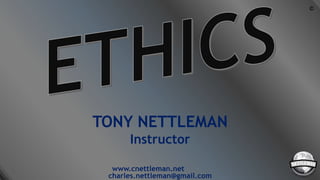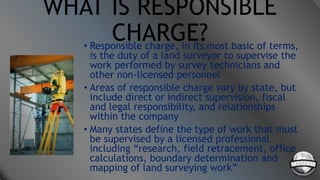Ethics and Professional Responsibility for Land Surveyors
- 2. WHAT ARE ETHICS? ŌĆóWell-founded standards of right and wrong that prescribe what humans ought to do, usually in terms of rights, obligations, benefits to society, fairness, or specific virtues ŌĆóMoral principles that govern a person's or group's behavior ŌĆóThe moral correctness of specified conduct
- 3. META-ETHICS ŌĆ£I have not increased nor diminished the measure, I have not diminished the palm; I have not encroached upon the fields.ŌĆØ
- 4. AUTONOMY AUTONOMY IS THE PRINCIPLE THAT ADDRESSES THE CONCEPT OF INDEPENDENCE ŌĆó Allow the client to make their own decisions based on their own values ŌĆó Encourage your clients to listen to your recommendations but make their own decisions ŌĆó Always encourage your clients to fully understand how their own decisions will affect others ŌĆó Persons not able to make their own decisions should not be allowed to act autonomously
- 5. HOW DO YOU MAKE AN ETHICAL DECISION (AND LIVE WITH IT)? ŌĆóIdentify the problem ŌĆóSpecify reasonable alternatives ŌĆóUse your ethical resources ŌĆóPropose and test possible solutions ŌĆóMake your choice
- 6. PROFESSION ŌĆó A vocation or occupation requiring special, usually advanced, education and skill; e.g. law or medical professions. Also refers to the whole body of such profession (BlackŌĆÖs Law Dictionary, 5th ed.) ŌĆó The labor and skill involved in a profession is predominantly mental or intellectual, rather than physical or manual (BlackŌĆÖs) ŌĆó The term originally contemplated only theology, law, and medicine, but as applications in science and learning are extended to other departments of affairs, other vocations also receive the name, which implies professed attainments in special knowledge as distinguished from
- 7. WHAT IS RESPONSIBLE CHARGE?ŌĆó Responsible charge, in its most basic of terms, is the duty of a land surveyor to supervise the work performed by survey technicians and other non-licensed personnel ŌĆó Areas of responsible charge vary by state, but include direct or indirect supervision, fiscal and legal responsibility, and relationships within the company ŌĆó Many states define the type of work that must be supervised by a licensed professional including ŌĆ£research, field retracement, office calculations, boundary determination and mapping of land surveying workŌĆØ
- 8. WHAT ETHICAL CHOICES WOULD YOU MAKE IN THE FOLLOWING SITUATIONSŌĆ”
- 9. MONOPOLY MONEY! I had to create this section of the seminar because SO MANY SURVEYORS are charging EXORBITANT FEES!
- 11. BINDING CASE LAW ŌĆóMandatory Authority: Primary sources that a court must conform with, including the jurisdictionŌĆÖs constitution, statutory code, administrative regulations and binding court cases ŌĆóPersuasive Authority: any writing (see above) that influences or is used to











